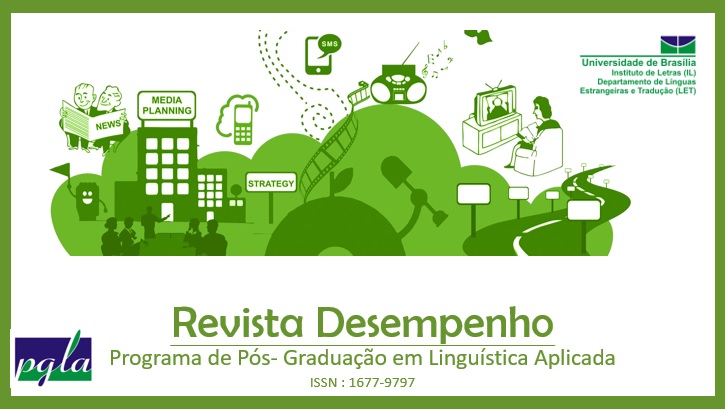SLA UNDER CONSIDERATION: AN EXPERIENCE OF A SUCCESSFUL LEARNER OF THE ENGLISH LANGUAGE
Résumé
A second language learning experience is always discernible by its uniqueness. Each learning individual lives the singularity of this process in their own approach. The present research performs a careful analysis of the aspects that helped composing the successful English acquisition of a sole individual. This case study investigates which of the existent theories or hypotheses in the SLA field of inquiry are related to the facts narrated by the participant, and what elements most influenced this process. A study of this nature may demonstrate how profitable it can be for current studies in SLA to deeper explore single cases as the one herewith.
Téléchargements
Références
CHOMSKY, N. Aspects of the Theory of Syntax. Massachusetts: MIT, 1965
CLANDINEN, D.J.; CONNELLY, F.M. Narrative Inquiry. San Francisco: Jossey-Bass, 2000.
COOK, V. (2001) Second Language Learning and Language Teaching. 4. ed. United Kingdom: Hodder Education, 2008.
CROOKES, G.; SCHMIDT R. Motivation: Reopening the research agenda. Language Learning, v. 41, n. 4, p. 469-512, 1991.
DECHARMS, R. Personal causation: The internal affective determinants of behavior. New York: Academic Press, 1968.
DECI, E.; RYAN, R. Intrinsic motivation and self-determination in human behavior. New York: Plenum, 1985.
DECI, E.; RYAN, R. Overview of Self-determination Theory: An Organismic Dialectical Perspective. In: DECI, E.; RYAN, R. (Eds.). Handbook of Self-determination Research. Rochester: University of Rochester, 2002, p. 3-36.
DORNYEI, Z. Teaching and researching motivation. Harlow, England, United Kindgom: Longman, 2001.
DULAY, H.; BURT, M. Remarks on creativity in language acquisition. In: BURT, M.; DULAY, H.; FINNOCHIARO, M. (Eds.) Viewpoints on English as a Second Language. New York: Regents, 1977, p. 95-126.
DULAY, H., BURT, M. & KRASHEN, S. Language Two. New York and London: Oxford University, 1982.
ELLIS, R. Second Language Learning and Second Language Learners: Growth and Diversity. TESL Canada Journal, v. 7, n. 1, p. 74-94, Nov. 1989.
ELLIS, R. The Study of Second Language Acquisition. Oxford: Oxford University, 1994.
ELLIS, R. (1997) Second language acquisition. In: WIDDOWSON, H. G. (Ed.) Oxford Introduction to Linguistics. Oxford: Oxford University Press, 9. ed., 2003.
ELLIS, R. Individual Differences in Second Language Learning, In: DAVIES, A.; ELDER, C. (Eds.). The Handbook of Applied Linguistics. Australia: Blackwell Publishing, 2004, p. 525-551.
ELLIS, R. Principles of Instructed Language Learning. Asian EFL Journal, British Virgin Islands, v. 7, n. 3, p. 9-24, Sept. 2005.
GARDNER, R. C. The Socio-Educational Model of Second Language Learning: Assumptions, findings, and issues. Language Learning, v. 38, n. 1, p. 101-126, March 1988.
GARDNER, R. Integrative motivation and second language acquisition. In: DORNYEI, Z.; SCHMIDT, R. (Eds.). Motivation and Second Language Acquisition. Honolulu: University of Hawaii, Second Language Teaching and Curriculum Center, 2001, p. 69-90.
GARDNER, R. C.; LAMBERT, W. E. Motivational variables in second language acquisition. Canadian Journal of Psychology, v. 13, n. 4, p. 266-272, Dec. 1959.
GARDNER, R. C.; LAMBERT, W. E. Attitudes and Motivations in Second Language Learning. Rowley, MA: Newbury House, 1972.
KLEIN, W. (1986) Second Language Acquisition. 8. ed. United Kingdom: Cambridge University, 2003.
KRASHEN, S. Second Language Acquisition and Second Language Learning. Oxford: Pergamon, 1981.
KRASHEN, S. Principles and Practice in Second Language Acquisition. Oxford: Pergamon, 1982.
KRASHEN, S.; TERRELL, T. The natural approach: Language acquisition in the classroom. Hayward, CA: Alemany, 1983.
LUMSDEN, L. Student motivation to learn. ERIC Digest, n. 92, 1994.
MCLAUGHLIN, B. The monitor model: Some methodological considerations. Language Learning, v. 28, n. 2, p. 309-332, Dec. 1978.
MCLAUGHLIN, B. Theories of Second Language Learning. London: Edward Arnold, 1987.
MCLAUGHLIN, B. Conscious versus Unconscious Learning. A Journal for Teachers of English to Speakers of Other Languages and of Standard English as a Second Dialect. TESOL Quarterly, v. 24, n. 4, p. 617-634, winter 1990.
MCLAUGHLIN, B.; ROSSMAN, T.; MCLEOD, B. Second language learning: An information-processing perspective. Language Learning, v. 33, n. 2, 135-158, Jun. 1983.
MITCHELL R.; MYLES F. (1998) Second Language Learning Theories. 2. ed. United Kingdom: Hodder Education, 2004.
NOELS, K. New orientations in language learning motivation: Toward a contextual model of intrinsic, extrinsic, and integrative orientations and motivation. In: DORNYEI, Z.;SCHMIDT, R. (Eds.). Motivation and second language acquisition. Honolulu: University of Hawaii, Second Language Teaching and Curriculum Center, 2001, p.69-90.
NUNAN, D. Second Language Acquisition. In: CARTER, R.; NUNAN, D. (Ed.). The Cambridge Guide to Teaching English to Speakers of Other Languages. United Kingdom: Cambridge University, 2001, p. 87-92.
PINTRICH, P.; SCHUNCK, D. Motivation in Education: Theory, research and application. 2. ed. New Jersey: Merril Prentice Hall, 2002.
RYAN, R.; DECI, E. Intrinsic and extrinsic motivations: Classic definitions and new directions. Contemporary educational psychology, v. 25, n. 1, p. 54-67, Jan. 2000.
SHIFFRIN, R.; SCHNEIDER, W. Controlled and automatic human information processing: II. Perceptual learning, automatic attending, and a general theory. Psychological Review, v. 84, n. 2, p. 127-190, Jan. 1977.
SKINNER, B. Verbal Behavior. New York: Copley Publishing Group, 1957.
SLAVIN, R. Educational psychology: Theory and practice. 7. ed. Boston, MA: Allyn and Bacon, 2003.
Téléchargements
Publié-e
Comment citer
Numéro
Rubrique
Licence
Autores que publicam nesta revista concordam com os seguintes termos:
Autores mantém os direitos autorais e concedem à revista o direito de primeira publicação, sendo o trabalho simultaneamente licenciado sob a Creative Commons Attribution License o que permite o compartilhamento do trabalho com reconhecimento da autoria do trabalho e publicação inicial nesta revista.
Autores têm autorização para assumir contratos adicionais separadamente, para distribuição não-exclusiva da versão do trabalho publicada nesta revista (ex.: publicar em repositório institucional ou como capítulo de livro), com reconhecimento de autoria e publicação inicial nesta revista.
Autores têm permissão e são estimulados a publicar e distribuir seu trabalho online (ex.: em repositórios institucionais ou na sua página pessoal) a qualquer ponto antes ou durante o processo editorial, já que isso pode gerar alterações produtivas, bem como aumentar o impacto e a citação do trabalho publicado (Veja O Efeito do Acesso Livre).






